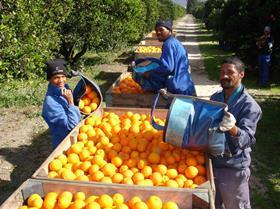
The South African citrus sector is calling on importers in the UK to take action or face a total ban of their produce.
Twenty-yearold regulations restricting the movement into the EU of citrus fruit from countries where the citrus black spot (CBS) fungus occurs, such as South Africa, are the subject of an international dispute settlement process.
However, the EU has been intensifying enforcement to the point that South Africa faces the potential closure of the common market to its fruit. If more then five incidences of a fungus are discovered in a season, then a ban will be introduced. Last season, for example some 30 incidences were recorded.
The Citrus Growers Association points to a pest-risk analysis study which calls into question the need for such measures. “This formalised the contention that these regulations are both without adequate technical justification and are and excessively trade restrictive measure,” The CGA said in a statement. CBSoccurs in most southern hemisphere citrus-growing countries but has never been established in any country with a Mediterranean-type climate,the CGA contends. “There is no recorded incidence of the fungus spreading to and becoming established in another country or region through the movement of infected fruit.”
Nigel Jenney, chief executive of the Fresh Produce Consortium said: “This is a very serious situation and gives us cause for considerable concern given the complementary presence of South African citrus in the UK marketplace at atime when there is no competition with the EU season.”
Jenney hasbeen liaising with the plant health authorities in the UK and the FPC wants a regional approach to be taken so that exports to the UK and northern Europe can continue while science-based research is carried on the threat that CBS might pose to citrus production in EU member states.



